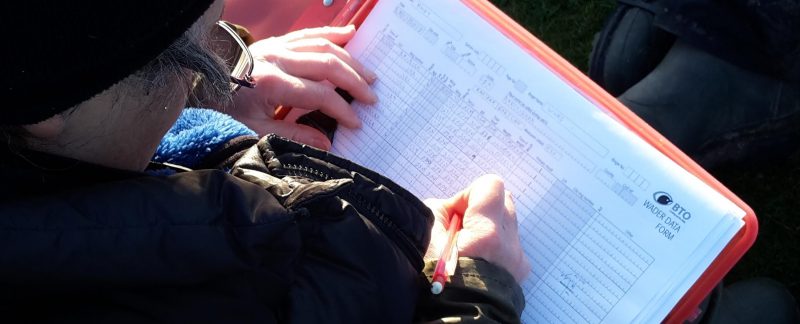WWRG offers training opportunities both for ringers wishing to gain general experience of wader catching and processing (both mist-netting and cannon-netting) as well as for those training for a cannon-netting endorsement to their permit. Training takes place during our fieldwork sessions, with bird welfare as a priority and within our scientific objectives. However, on each trip, we limit the numbers of those wishing to train in proportion to experienced wader ringers, both to safeguard birds and so that we can provide appropriate training.
General experience of wader catching and processing
Ringers of all levels of experience are welcome to join WWRG to gain experience in wader catching. When you book for a trip, you will be asked about your ringing experience, particularly with waders, and what level of ringing permit you hold (if any). This helps the fieldwork leaders when jobs are being allocated.
When a catch is made, everyone needs to get involved so that we can collect the data quickly and efficiently. There are a variety of jobs to be done.
Ringing
We ring as part of a team, with one experienced ringer in charge. All birds are ringed and aged in the ringing team and this includes those birds which are already ringed. This is a great way to get experience of waders and wader ageing and to ring a variety of birds using hard rings. There may also be opportunities to collect birds from keeping cages and to release them.
Processing
To be as efficient as possible and to keep data repeatable, we work as a processing team. A bird is passed between ringers with each taking different measurements. We have found this to be both quicker and more accurate than having one ringer taking all the measurements. There are a number of jobs on the processing team.
- Scribe
Probably the hardest but most important job, needs good knowledge of waders (but is a good place to learn more), ability to concentrate to collect all the data and check it makes sense!
- Lead Processor
Needs to be an experienced wader ringer who can age (and sex) the species being processed. Moult, plumage scores and wing lengths are all part of this role. Waders have strong bendy wings which are harder to straighten than passerines. Start to learn by joining the processing team in other positions.
- Bill and total head lengths
Needs reasonable experience of handling birds. Sits next to the lead processor so can see how birds are aged and sexed (but may be a bit busy to look very often!).
- Weighing
A good place to start, with practice in handling birds and he opportunity to see how the birds are aged and sexed.
To help the learning process, we carry out blind winging comparisons both comparing two ringers and with one ringer measuring twice. This is very helpful in training. On small catches there may be opportunities to practice taking wing lengths and doing moult scores while sitting at the end of processing team. On some catches we also set up a training processing team giving an opportunity for ringers to experience the different jobs.
If you are interested in a particular job, please say so when jobs are being organised. It is not always possible for everyone to do the job they would like (particularly when we are very busy) but the team leaders will try to get everyone involved.
Training for a cannon-netting endorsement
Ringers training for a cannon-netting endorsement will normally be expected to gain experience both with their normal team and with another cannon-netting team. WWRG offers the opportunity to work with the team to gain this experience a well as independent assessments. At our longer, summer trips, we host foreign ringers looking for a ‘crash course’ in cannon-netting. Although a week catching is clearly insufficient training to take charge of a cannon-netting team, it allows rapid development towards that goal. Members of the group also often travel to train foreign teams on their catching sites.
As with general wader ringing, we limit the numbers of ringers looking for this level of experience on any trip to ensure they receive an appropriate level of training, while taking account of bird welfare and our scientific objectives. There will not normally be more than one non-WWRG cannon-netting trainee on a trip. As far as is possible and appropriate, cannon-netting trainees will be involved in all aspects of work from recceing (looking for catching opportunities), through dealing with equipment, setting nets, taking a catch, ringing and processing, running a catch and dealing with data.
Any cannon-netting trainees wishing to join us should make contact well in advance to discuss their needs and check that we will be able to provide the training they are looking for.

